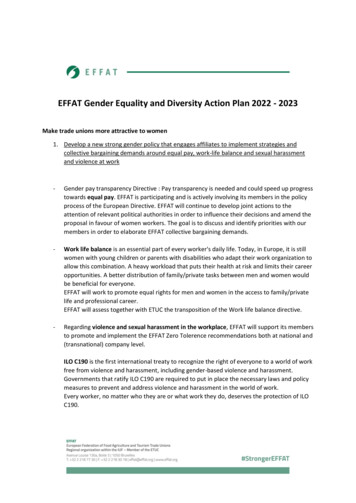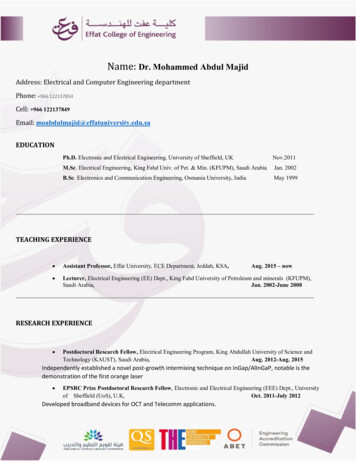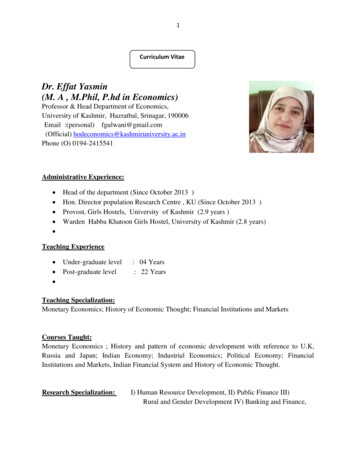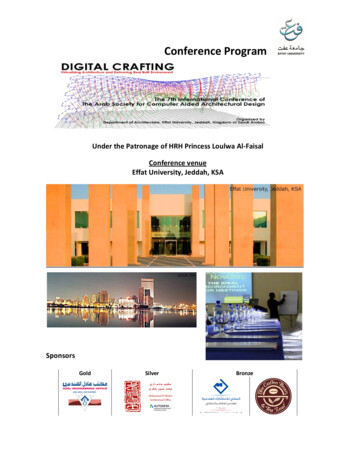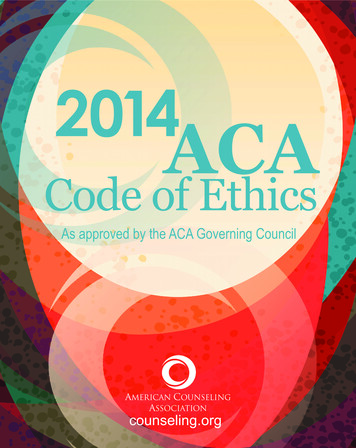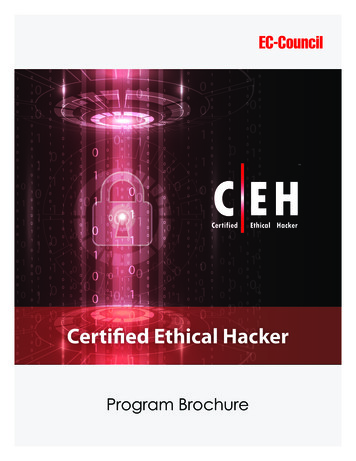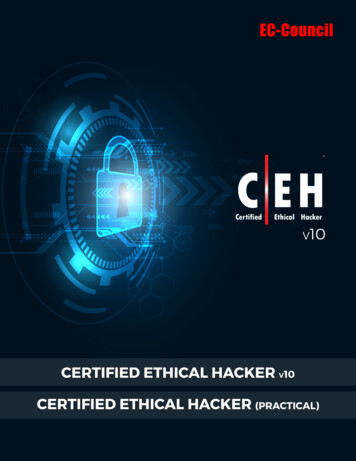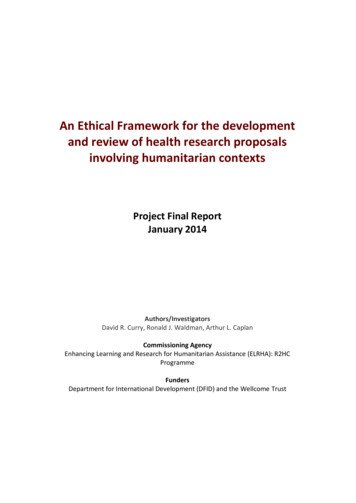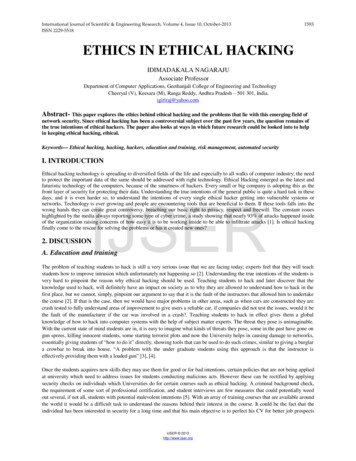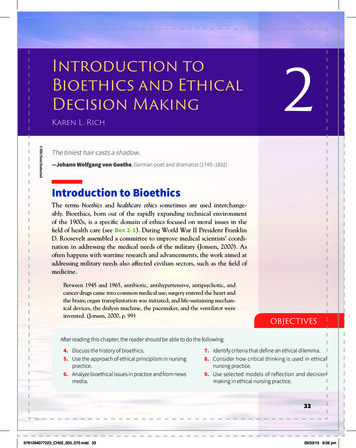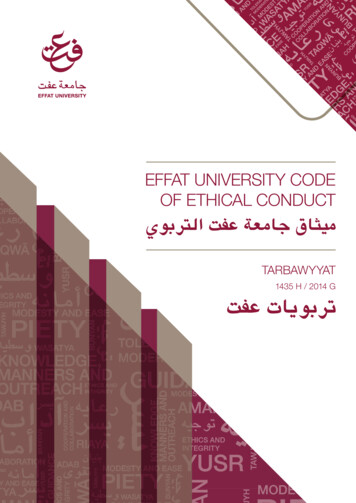
Transcription
EFFAT UNIVERSITY CODEOF ETHICAL CONDUCTTARBAWYYAT1435 H / 2014 G
ACKNOWLEDGMENTSThe Effat University Code of Ethical Conduct is true testament to the diverse skills,talents and abilities of the people here. In fact, without their unwavering support,ideas and advice, the Code could never have been written at all.For me, creating the Code hasdeepened my understanding of, andappreciation for, the ethical principlesthat underpin our lives. The detaileddescriptions it contains havereconnected me with the historicalteachings of Islam, uncovering scoresof half-forgotten characteristics, beliefsand concepts that still inform thethinking and behaviour of teachers,learners and researchers today. I hopeand believe it will be a great assetto our community.My deepest thanks are owed to severalpeople for encouraging me to start thework, persevere with it, and finally topublish it; to all those who providedsupport, talked things over, read, wrote,offered comments, assisted in theediting, proofreading and design.You have been my inspiration andmotivation, forming a team thatprovides the perfect blend ofknowledge and skills!My gratitude is due to:Dr Houria Oudghiri, Dr Salwa Ibrahim,Dr Rania Ibrahim, Dr Malak Al Nory,Dr Eman Mohammad, Dr Sanna Dhahir,Dr Khlood Ashgar, Dr Zainab Abuelma’atti,Dr Ann Helsdingen, Dr Mustapha Tajdin,Reem Madani, Afraa Gutub,Shafak Al Barazi, Areej Abdurrahman,Iman Al Ameer, and Rasha Zahrawi.
TABLE OF CONTENTSTRANSLITERATION SYSTEM2PRESIDENT’S STATEMENT3EFFAT UNIVERSITY CODE OF ETHICAL CONDUCT4CODE OF ETHICAL CONDUCT5Purpose and Obligations5TARBAWYYAT EFFAT7Pillars of the Effat University Code of Ethical Conduct7THE CODE OF ETHICAL CONDUCT AUTHORITIES13The Committees13The Ethics Higher Committee13The Faculty Ethics Committee13The Staff Ethics Committee14The Research Ethics Committee14The Students Ethics Committee14THE ETHICS COMMITTEES15Roles and Responsibilities15HANDLING VIOLATIONS OF EFFAT CODE OF ETHICAL CONDUCT17Policy and Procedures17APPENDIX211
TRANSLITERATION SYSTEMArabicTransliteration ArabicTransliteration ArabicTransliteration ا ب ت ث ج ح خ د ذ ر ز س ش abtṯğḥḫdḏrzsšṣḍţẓw, ūyã⁾aiuaiauīyūwatā ص ض ط ظ ع غ ف ق ك ل م ن هـ Arabic names and words are transliteratedthroughout this document following the abovesystem unless in quotation or part of the data.The following terms cited in this document remainas they commonly appear in English and are nottransliterated to avoid confusion:Allah, Prophet Mohammad, Aya, Queen Effat AlThunayyan, IQRA, Surat Al-Hujuratt, Surat Fatir,Surat Al-Baqarah, Surat Luqmān, Quran,Hadith, Bukhari and Muslim.2ͨġfqklmnh و ي ى ء َُِ ـَيـ ـَ ْو ـِيّـ ّ ـُو ة آ
PRESIDENT’S STATEMENTCOMMITMENT TO EFFAT UNIVERSITY CODE OF ETHICAL CONDUCTMembers of the Effat family,Effat University strongly believes in the importance of creating a value-consciousenvironment. This stance stems from the University’s belief that educationalinstitutions should be unambiguous about their values, and should advocateadherence to these values. At Effat University there is a strong and direct relationshipbetween the conduct expected of its constituents and IQRA core values. IQRA corevalues constitute an essential part of Effat University’s Code of Ethical Conduct as itprovides a general framework for its activities. Other contributors include the vision,mission and goals of the University, the characteristics of its members, as well asthe legacy of its founder, Queen Effat Al Thunayyan.The Effat University Code of EthicalConduct is intended to provide a setof broad statements on equality andjustice, respect for others, personaldevelopment, professional conduct, andsocial responsibility specific to universitysettings but general enough to guideinteractions beyond campus grounds.The President, Vice President, Provost,Deans, Department Chairs, Directors,Managers, and other unit heads andsupervisors are responsible for fosteringrespect for and adherence to the Codeof Ethical Conduct. I encourage allmembers of the University to acquaintthemselves, their colleagues andsupervisees with the Effat UniversityCode of Ethical Conduct to avoidundesired consequences. It is worthnoting here that the Code is notintended to replace, and may besupplemented by, specific Universitypolicies that have been adopted in thepast and may be adopted in the future.Compliance with this Code is mandatoryand is an integral component of allcontracts of employment. In accordancewith this Code of Ethical Conduct theUniversity developed a set of selfexplanatory policies and proceduresthat regulate the Code. All informationis available on the University’s internalportal. In addition, and for confidentialitypurposes, emails may be sent toethics@effatuniversity.edu.sa that isoperated by the University Ethics HigherCommittee under the authority of thePresident. Complaints or incidents maybe reported to the University EthicsCommittee anonymously via the website,email or letter, or by telephone.Our success as an institution dependson the collaborative effort of all membersin advocating, promoting and strictlyadhering to the Effat University EthicalCode of Conduct. I, therefore, urge youto carefully read this document takinginto consideration its noble purpose.Thank you for your unwaveringcommitment to excellence.Dr Haifa Reda Jamal Al LailPresident of Effat University3
EFFAT UNIVERSITY CODE OF ETHICAL CONDUCTINTRODUCTIONDifference and individuality characterise human beings. Ideas, ambitions, emotions,behaviours, beliefs, and social groupings shape who we are. Cross-culturalfertilisation yields constructive results through the production of a master discoursethrough which identity, similarity and difference are identified.Islam is not only a religion but a way oflife. Islam provides a universal code ofconduct governed by ethics. The HolyQuran and Hadith of the ProphetMohammad (Peace be Upon Him)provide holistic guidelines to everyaspect of a persons affairs. Theseguidelines emphasise authenticityby way of virtues of which respect,kindness, honesty, tolerance, selfrestraint, patience, forgiveness andcompassion. Such values govern humaninteraction at all levels and differentsettings. All of the 114 Surat of theQuran emphasise ethical behaviour at alllevels, but Surat Al-Hujuratt in particularpays specific attention to standardsof social behaviour. Surat Al-Hujurattpreaches 18 universal codes of ethicsin its 18 ayas.Effat University’s Code of EthicalConduct draws on the teachingsof Islam. The Code is also influencedby the philosophy of the founder of EffatUniversity, Queen Effat Al Thunayyan(God rest her soul), who unceasinglysought to strike a balance betweentraditionalism and modernity, and theIQRA Core Values derived from theimperative “Read” the first word of theQuran revealed over 1400 years ago.4Since its establishment in 1999, EffatUniversity’s values have fosteredstewardship, respect, care and attentionto all its constituents. Our commitmentto integrity, honesty and fairness in ouroperations of which teaching, researchand service to the community is ourasset; it has set us nationally andinternationally as an institution cravingexcellence in all its endeavours.Drafting this holistic Code of EthicalConduct is a crucial step towards thedevelopment of Effat University. Ourmission is to advocate ethical conductin the management of our academic,research and community serviceactivities, as well as interactions withour stakeholders. Effat chose eightfundamental pillars that constitute itscode of ethical conduct and namedthem Tarbawyyat Effat. These pillarsare regulatory measures and crucialto the University’s progress as itcompetes for academic excellencein today’s highly competitive highereducation environment.
CODE OF ETHICAL CONDUCTPURPOSE AND OBLIGATIONSIntroductionEffat University is a multicultural environment with members – faculty, researchers,staff and students – from every continent. These members engage collaboratively orindividually in different activities and at different hierarchical levels. Thus, it is of utterimportance in such a multifaceted community that all members recognise and respectnot only their own rights and responsibilities, but those of others in the communities– national and international – they interact with. The purpose of the Effat UniversityCode of Ethical Conduct is to assist faculty, staff and students in identifying andresolving ethical matters that might arise in the course of their association withEffat University. The Effat University Code of Ethical Conduct is a guiding ratherthan prescriptive manual of the general principles governing human interaction.The purpose of the Code is to:1. Promote professionalism andexcellence among all membersof Effat University.2. Express shared assumptionsand organisational values.3. Provide direction to faculty,researchers, staff and studentsaffiliated with the Universityconcerning expected conduct.4. Assist faculty, researchers, staff andstudents in dealing with ethical issuesin ways that reflect the University’svalues and ethical standards.5. Guide faculty, researchers, staff andstudents in challenging situationswhere ethics are at stake.6. Detail the University’s socialresponsibilities.However, it must be recognised that:1. The Code is established inaccordance with other policies thatEffat University has in place.2. The Code does not, and cannot,cover every possible situation.3. Breaching the Code might resultin disciplinary action.5
Obligations of Effat Universitymembers towards the Effat UniversityCode of Ethical Conduct1. Does what I am saying or doingcomply with Effat University’s eightpillars of Tarbawyyat Effat?All members of Effat University – faculty,researchers, staff, labour and students– full, part-time, or visiting are responsiblefor their own behaviour and are obligedto conduct themselves in a manner thatupholds the four key principles: EffatUniversity Vision and Mission, the IQRACore Values, the Characteristics of EffatUniversity Members, and the Legacy ofQueen Effat1.2. What is the result of what I amsaying or doing on my reputation,the reputation of other membersof Effat University, and the reputationand integrity of Effat University asan academic institution well reputedin the national and internationalcommunity?The University fosters the values ofopenness, honesty, tolerance, fairnessand responsibility in social, moral,and academic matters. Also, all Effatmembers must keep in mind thatthe integrity and reputation of EffatUniversity with regard to each andevery undertaking are of equalimportance and must be protected.3. Does what I am saying or doingserve all Effat family members anda purpose beyond self-interest?4. Is my conduct worthy of emulation?Failure to act in accordance with theseobligations will be cause for investigation.The following questions should serveas guidance on one’s ethical conduct.For Effat University Vision and Mission, the IQRA Core Values, the Characteristicsof Effat University Members, and the Legacy of Queen Effat please visitwww.effatuniversity.edu.sa Hard copies of these documents are availableat the President’s Office, the Provost’s Office, and the library.16
TARBAWYYAT EFFATPILLARS OF THE EFFAT UNIVERSITYCODE OF ETHICAL CONDUCTIntroduction‘Tarbawyyat’ ( )تربويات is the name of the pillars that make up Effat University Codeof Ethical Conduct. Tarbawyyat is derived from the Arabic word for ‘educate’. Theword ‘tarbawyyat’ derives from the Arabic root ‘ ربى rabbã’ from which a numberof other words derive like the Arabic word for raise a child, feed a child, educate aperson, and even grow an object in size and capacity. The Arabic word for makingjam or preserves from fruits is also derived from this word. Tarbawyyat is the pluralof تربية which is associated in Arabic with educating human beings to a standardof manners and equipping them with the necessary knowledge and skills to lead asuccessful role in the communities they inhibit. Inspired by this all-inclusive holisticnoun, Effat University adopted the following eight fundamental pillars into what itrefers to as Tarbawyyat Effat (please see Appendix 1 for further details).First Pillar: ( تقوى Ţaqwã) PietySecond Pillar: ( آداب Ādab) Knowledge, Manners and OutreachThird Pillar: ( رعاية Ricayya) NurturingFourth Pillar: ( بنيان مرصوص Bunyan Marsūs) Cooperation and CollaborationFifth Pillar: ( وسطية Wasaţya) Tolerance and ModerationSixth Pillar: ( يسر Yusr) Modesty and EaseSeventh Pillar: ( أمانة Amanah) Ethics and IntegrityEighth Pillar: ( توجيه Tawğyh) GuidanceThese eight pillars are the route to achieving the vision of Queen Effat (God rest hersoul), and provide the framework for all the affairs of Effat University.7
First Pillar: تقوى (Ţaqwã) Piety“And among people and movingcreatures and grazing livestock arevarious colours similarly. Only those fearAllah, from among His servants, whohave knowledge. (Alternatively – Onlythose from among his servants whohave knowledge fear Allah – DFR)Indeed, Allah is Exalted in Might andForgiving”. (Surat Fatir 35:28)Ţaqwã is the pillar of all pillars. Ţaqwãdenotes a range of meaning: piety, virtue,devotion, goodness, and faithfulness.The Quranic verse from Surat Fatirassociates Ţaqwã with scholars. At EffatUniversity, the search for knowledge andenlightenment is to be guided by thevirtue of Ţaqwã in every conduct. In thissense Ţaqwã signifies the importanceof being conscious of Allah in learning,teaching and undertaking research.Ţaqwã in undertaking research isacknowledging ownership of materialand intellectual property. Ţaqwãin teaching is devotion in deliveringknowledge, while Ţaqwã in learning isfaithfulness in the quest for knowledge.Ţaqwã also has a strong significance inorganisational management. Ţaqwã inthis sense is wrong doing aversion. Thepious person or ţaqy ( )تقي is the one whoguards from falling prey to mistakes andmischievous conduct. However, Ţaqwã,by no means, implies infallibility. It rathersuggests attentiveness and risk aversionbe it behavioural or managerial.8Second Pillar: آداب (Ādab) Knowledge, Mannersand Outreach آداب in Arabic incorporates three distantyet interrelated meanings that derivefrom the same root: knowledge, morals,and outreach. In the first two centuriesof Islam آداب Ādab denoted knowledgeof the sciences and history, philosophy,and theology. Later, Ādab was restrictedto literary work. Another use for آداب is manners as in ( آداب الطعام والشراب tablemanners). آداب also shares the roots formadubah (banquet), which is a synonymfor generosity. These layers of meaningare reflected in Effat University: a sourceof knowledge in its broad sense, whichconstitutes the identity of any liberal artsorganisation; and a drive to reach to theimmediate and international communityfor the purpose of serving and exchangingknowledge – both in a polite andvirtuous fashion.Third Pillar: رعاية (Ricayya) NurturingThe concept of Ricayya ( )رعاية meanscontinuous care and development.This is an important concept in Islambecause it starts with our own selves,then our families, and the communityat large. Nevertheless, nurturing andupbringing are most important withrespect to the children and the youthin any society, so that they are broughtup upon the correct path of Islam.
“And [mention, O Muhammad], whenLuqman said to his son while hewas instructing him, “O my son, donot associate [anything] with Allah.Indeed, association [with him] is greatinjustice.”{13} And We have enjoinedupon man [care] for his parents. Hismother carried him, [increasing her] inweakness upon weakness, and hisweaning is in two years. Be grateful toMe and to your parents; to Me is the[final] destination.{14} But if theyendeavour to make you associate withMe that of which you have noknowledge, do not obey them butaccompany them in [this] world withappropriate kindness and follow the wayof those who turn back to Me [inrepentance]. Then to Me will be yourreturn, and I will inform you about whatyou used to do.{15} [And Luqman said],“O my son, indeed if wrong should bethe weight of a mustard seed and shouldbe within a rock or [anywhere] in theheavens or in the earth, Allah will bring itforth. Indeed, Allah is Subtle andAcquainted. {16} O my son, establishprayer, enjoin what is right, forbid what iswrong, and be patient over what befallsyou. Indeed, [all] that is of the matters[requiring] determination. {17} And donot turn your cheek [in contempt] towardpeople and do not walk through theearth exultantly. Indeed, Allah does notlike everyone self-deluded and boastful.{18} And be moderate in your pace andlower your voice; indeed, the mostdisagreeable of sounds is the voiceof donkeys. {19}.” (Surat Luqmān31:13-19).Similarly, the Prophet Muhammad (Peacebe Upon Him) said: “Every one of your(people) is responsible, and everyone isresponsible for whatever falls under hisresponsibility. A man is like a shepherd ofhis own family, and he is responsible forthem” (Bukhari and Muslim).Effat University is conscious of therole it plays in shaping tomorrow’sgenerations. Care and developmentat Effat University take different shapesand forms: teaching and learning,welfare, discretion, health, safety,and security. In other words, EffatUniversity cares for the developmentof its constituents with the purposeof creating ambassadors in a healthyenvironment. A derivate from the sameroot is the Arabic ( رعِ يَّة raciyyah) meaningsubjects under the guardianship of acaretaker. Ricayya at Effat Universityimplies an empathetic leadership style– a style that Effat prides itself on –referring to the ability to understand,relate and be sensitive to stakeholders.Fourth Pillar: بنيان مرصوص (Bunyan Marsūs) Cooperationand CollaborationTo spread among the peopleco-operation and synergy, ProphetMohamed (Peace be Upon Him)advocated solidarity. In a metaphoricaldescription he likened co-operativebelievers to a solid, powerful, andcohesive structure that is hard to pulldown. Prophet Mohamed (Peace beUpon Him) said, “A believer to anotherbeliever is like a building whose differentparts enforce each other.” The Prophetclasped his hands with the fingersinterlaced (while saying that).Being an educational institution thatendeavours to achieve excellence, EffatUniversity is convinced that effectivecommunication, interaction andoutreach, collaboration and partnershipsare all sources of inestimable value to allmembers at Effat University, and tosociety at large. All members of the Effatfamily are encouraged to embrace aculture of collaboration characterisedwith maximum individual commitmentand contribution, tolerance, modesty,flexibility, creativity, value adding,acceptance of others, and recognition9
believing in the unity and harmonybetween all mankind. Effat Universityequally believes that pairing individualrecognition with collective teamrecognition is vital to effective motivationof all team members. The formula forbalancing collaborative and individualrespect and recognition is describedin Surat Alhujurat (Aya13):“O mankind! We created you from asingle (pair) of a male and a female, andmade you into nations and tribes, that yemay know each other (not that ye maydespise each other). Verily the mosthonoured of you in the sight of Allah is(he who is) the most righteous of you.And Allah has full knowledge and is wellacquainted (with all things).”Effat University places high emphasis oncultural sensitivity especially in balancingcollaborative and individual interests andactivities. The University regulates suchinterests and activities through a numberof policies in its Policies and ProceduresManual. Activities that represent a caseof failure to meet these regulations and/or considered incidents of misconductmay result in disciplinary action includingthe possibility of dismissal of the studentor termination of employment.Fifth Pillar: ( وسطية Wasaţya)Tolerance and Moderation“And thus we have made you a justcommunity that you will be witnessesover the people, and the Messenger willbe a witness over you. And we did notmake the qiblah which you used to faceexcept that we might make evident whowould follow the Messenger from whowould turn back on his heels. Andindeed, it is difficult except for thosewhom Allah has guided. And neverwould Allah have caused you to loseyour faith. Indeed Allah is, to the people,kind and merciful.” (Surat Al-Baqarah2:143)10The term ‘Wasaţya’ refers to the virtueand value of always striking a balance.At an individual level it includes balancein attitude; at an organisational level itinvolves balance of vision and mission.Moderation is a teaching of Islam andone of its fundamental characteristicsthat Effat has adopted. One might thinkthat balance is always the third choicewhen two extreme choices become validoptions. However, Effat University initiallyadopts a balanced approach as itsprinciple methodology. This approach isthe core value from which all decisions,structures, concepts, and evencurriculum emanate. This key approachalso characterises individuals at EffatUniversity in their day-to-day affairs.Within this framework organisationalbalance is ideologically significant as theUniversity defines its presence on theworld map of educational institutions.In all its endeavours the University strivesto strike a delicate yet subtle balancebetween modernity and heritage,integration and identity, organisationalinterests and social expectations.Effat University prides itself on havingderived from the light of justice thevalue of mutual respect shared byadministrators, faculty members,researchers, staff, and students asthey perform their respective duties.It is on this basis that the laws of theinstitution have been structured; andit is within this framework that specificpolicies and procedures undergocontinuous revision and amendment,so that the University maintains justicein managing all its affairs in the best waypossible. Nonetheless, the Universityacknowledges the hardships frequentlyfaced in achieving absolute justice andequality, for Allah alone possesses thebeauty of perfection.
Sixth Pillar: ( يسر Yusr)Modesty and EaseSeventh Pillar: ( أمانة Amanah)Ethics and Integrity“So indeed with hardship is ease.Indeed with hardship is ease.”(Surat Al-Inshirah 94: 5-6)Prophet Mohammad (Peace be UponHim) said, “I was sent to complete thebest of morals.”The Arabic word Yusr ( )يسر means easeand it is the opposite of difficulty ( )عسر which means hardships. أمانة is a pillar within a pillar. ‘Ihsan’ ( )إحسان which derives from the Arabic حَ سَ ن , theroot of several words, is the umbrella for allpillars of manners. Ihsan means ‘seekingperfection in every deed’. The root wordis mentioned in the Quran in 195 positions;12 of them in the form of Ihsan. Seekingperfection in every deed stems from thecore values of Islam “It is to worshipAllah as though you are seeing Him, andwhile you see Him not yet truly He seesyou”. In this sense, Ihsan carries thefollowing five characteristics:In this verse Allah is telling us thatwhatever difficulties or troubles anindividual may encounter He alwaysprovides a solution, a way out, a relief,a guide to lead to comfort andcontentment. The Surat confirms thismessage by repeating the verse twiceand stressing “ مع with” to assure humanbeings that relief does not come afterdifficulty but with it. These two verses inthe eight Ayas short Surat of Al-Inshirahgives a message of hope andencouragement in a time of darknessand difficulty. Prophet Mohammad(Peace be upon Him) also said, “Hewho removes from a believer one of hisdifficulties of this world, Allah will removeone of his troubles on the Day ofResurrection; and he who finds relief fora hard-pressed person, Allah will makethings easy for him on the Day ofResurrection; he who covers up (thefaults and sins) of a Muslim, Allah willcover up (his faults and sins) in thisworld and in the Hereafter.”Following the guidance of these versesand the advice of Prophet Mohammad(Peace be Upon Him), Effat Universitystrikes a balance between rigidity andsimplicity. Because Effat Universitybelieves that creativity is born out of thesimplicity of procedures, the Universityrefrains in all its conduct from adoptingbureaucratic and centralised processesand favours delegation and crossmanagement participation.I for Itqan: Itqan, or ‘excellence’ meansto arrange and dispose of things in ascientific and artistic way in order toobtain perfect results. Effat alwayschallenges its members to developa sustained passion for continuousimprovement and innovation so thatthe institution serves higher educationneeds in Saudi Arabia and the worldat large in the best way possible.H for honesty: Honesty accordingto Merriam Webster Dictionary means“the quality of being fair and truthful”.The University expects all those engagedin scholarly activities including research,teaching and learning; communityservices, and; management of projectsto observe high ethical standards.Thus, the University does not toleratefraud, theft, embezzlement, harassment,discrimination, violence, favouritism, ornepotism, conflicts of interest, corruptionin all its forms, misappropriation ofUniversity property or funds, or violatingany of Effat University codes andpolicies. The University has the rightto seek prosecution against individualswho violate codes and policies and/orother disciplinary actions.11
S for stewardship: According to theMerriam Webster Dictionary, stewardshipis “the activity or job of protecting andbeing responsible for something”. EffatUniversity extends the application of thischaracteristic to volunteering, communityservice and giving. This is because theUniversity believes not only in interacting,but that engaging with the communitiesit serves promotes welfare in the society.A for aspiration: Aspiration is thestrong desire to achieve somethinggreat. This attitude does not grow ina vacuum but is the outcome of aholistic approach to life – an approachcharacterised by positivity, openness,and optimism and guided by clearvisions. Effat University encouragesan environment conducive to positivethinking by setting clear goals andguidelines for its faculty, researchers,staff and students while allowing andrewarding creativity and innovation.This is because it believes negativityhampers progress and productivity,whereas positivity breeds productivity!N for non-profit privateorganisational management:Effat University is proud to be a privatenon-profit organisation committed tothe principles and characteristics ofeffective non-profit management. TheUniversity strongly believes that thesecharacteristics – which range fromstrong commitment to the mission,businesslike leadership and governance,transparency, sustainability and riskmanagement, to strong communityconnections and embracing technology– will help it achieve the highest levelsof success.12Eighth Pillar: ( توجيه Tawğyh)GuidanceOn the Authority of Abu Ruqayya ibnAus Ad-Daree (RAA) that the ProphetMohammed (Peace be Upon Him)said “The Deen (religion) is naseehah(advice/sincerity).” We said, “To whom?”He said, “To Allah, His Book, HisMessenger, and to the leaders ofMuslims and their common folk.”(Narrated by Muslim)Sincere advice, guidance and counsellingare pillars in the educational process atEffat University. The educational processdoes not include students only but alsofaculty members, researchers, staff, andthe administration staff who make ourday to day affairs possible. Guidance isoffered to all members in several forms.While informal guidance is a natural spiritbetween the different members of theEffat family, formal processes includepolicies and procedures, bylaws, manuals,and orientation sessions. The Universityis also governed by different Saudi lawsand the Islamic Sharia Law adoptedby the Saudi government. Althoughthe provisions of all laws governingEffat University provide some guidance,members of Effat University need to usejudgment at all times in assessing whatwould be misconduct. Ultimately, it is themember’s responsibility to know what doesand does not constitute appropriateconduct. Acts of misconduct may resultin an investigation followed by disciplinaryproceedings and/or an investigation bySaudi authorities.
THE CODE OF ETHICAL CONDUCT AUTHORITIESTHE COMMITTEESIntroductionThe highest authority in all matters related to ethics at Effat University is the UniversityEthics Higher Committee. Membership in the Committee is renewed annually fornon-permanent members following a recommendation from the President of EffatUniversity and the approval of the University Council. The formation of the Committeeis formalised and circulated on campus. Accordingly, the President forms foursubordinate ethics committees, each having a minimum of five members. All ethicscommittees are formed at the beginning of the academic year. The subordinateethics committees report to the University Ethics Higher Committee and to thePresident of Effat University all cases of violation and misconduct within their areasof jurisdiction. Each subordinate ethics committee has the right to recommenddisciplinary actions. Endorsement of the recommendation(s) is the decision of thePresident. No member in any of these committees shall be directly or indirectlyrelated to the member(s) involved in cases under review by the committee.The Committees and authorised people are:The University Ethics HigherCommittee:The Faculty EthicsCommittee:1. President(permanent member-head)1. Provost(permanent member-head)2. Provost (permanent member)2. Dean of the college that homesthe case under investigation(invited member)3. Vice President of Administrationand Finance (permanent member)4. Dean of Student Affairs(permanent member)5. Head of the unit that homesthe case under investigation(invited member)6. Faculty of Islamic Studies(non-permanent member)3. Faculty of Islamic Studies(non-permanent member)4. Representative of Faculty Shura(non-permane
Effat University. The Effat University Code of Ethical Conduct is a guiding rather than prescriptive manual of the general principles governing human interaction. The purpose of the Code is to: 1. Promote professionalism and excellence among all members of Effat University. 2. Express shared assumptions and organisational values. 3.
